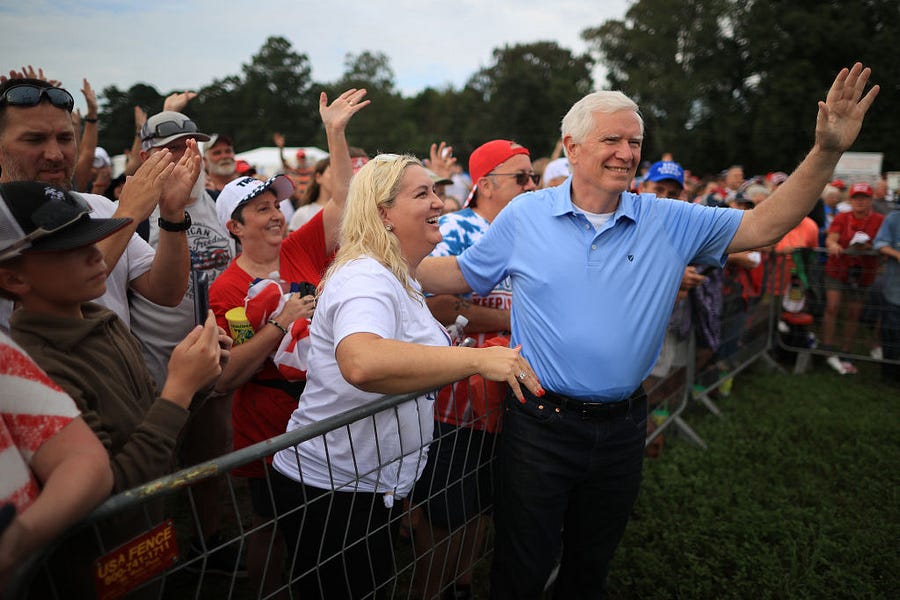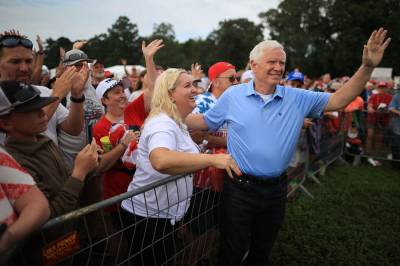Last spring, Alabama Rep. Mo Brooks was leading the pack in the Republican primary race to succeed retiring GOP Sen. Richard Shelby. Then, for him, came a series of unfortunate events.
His downward trajectory began in August, when a crowd of his supporters booed him for suggesting they ought to move past the 2020 presidential election. Soon his two biggest Republican primary rivals—former Shelby chief of staff Katie Britt and retired Army pilot Mike Durant—caught up to him in the polls and began out-fundraising him. Brooks’ waning momentum then quickly became evident to former President Donald Trump, who in late March rescinded his endorsement.
Whether or not these developments will seal Brooks’ fate could become clear in just a few hours, when Alabama voters head to the polls and pick their Republican nominee for the state’s open U.S. Senate seat. Brooks has regained some polling ground in recent days, but the race is still tight and likely headed to a June 21 runoff, as no candidate is likely to surpass the 50 percent threshold required to win Tuesday’s primary. RealClearPolitics’ polling average has Britt with a slight edge over Durant and Brooks, who are neck-and-neck in the race for the second runoff spot.
High-profile Republican lawmakers and organizations look to be just as divided as the electorate. Brooks has the National Rifle Association, the Club for Growth, and GOP Sens. Rand Paul and Ted Cruz in his corner. But he faces stiff competition from Durant, a wealthy businessman and former prisoner of war, and Britt, an attorney and former CEO of the Business Council of Alabama who has secured fundraising support from GOP Sens. Shelby, Mike Crapo, Deb Fischer, Shelley Moore Capito, Jim Inhofe, and Joni Ernst.
Britt and Durant have also benefited from the McConnell-aligned Senate Leadership Fund’s (SLF) $2 million contribution in early April to Alabama’s Future, a Super PAC that has spent the campaign cycle bashing Brooks in television ads.
“I thought that was very wise,” Shelby, Britt’s former boss, said in an interview Thursday of the contribution.
But the move was met with criticism from some Brooks supporters like Ted Cruz, who stumped for Brooks in Alabama this week and who nonetheless insists that Republican leaders should avoid putting a finger on the scale in competitive primary contests. “I always think it’s a mistake when leadership gets involved in primaries, and historically, it’s tended to backfire more often than not,” Cruz said in an interview last week.
In 2017, McConnell endorsed vulnerable incumbent Luther Strange in a special election for Alabama’s open U.S. Senate seat, and spearheaded SLF’s multi-million dollar fundraising efforts to fend off two GOP primary challengers in particular: Mo Brooks and Roy Moore, the embattled former judge who was accused of sexual misconduct. Moore won the GOP nomination but lost in the general to Democrat Doug Jones.
The Senate Minority Leader’s endorsement of Strange was not lost on Brooks, who in late March pulled a page out of his 2017 Senate campaign playbook and released a 90-second ad pledging to vote against McConnell as GOP leader if he is elected.
He also cited “McConnell’s ploys” for Trump’s decision to rescind his endorsement in late March, and has sought to portray SLF’s involvement in the race as evidence that Britt is McConnell’s handpicked candidate, even though SLF President Steven Law insists that the donation is purely an anti-Brooks effort and not an endorsement of any other candidate.
“Katie Britt is Mitch McConnell’s candidate. He’s supporting her and funding every lying ad against Mo Brooks,” the representative’s Senate campaign spokesman, Will Hampson, said in a statement. “Like in 2017, McConnell is trying to buy a RINO a Senate seat in Alabama. He hates Trump and America First candidates like Mo. Britt is bought and paid for by the Swamp. This is why President Trump will never support Katie Britt—she’s Mitch McConnell’s candidate. Anyone who claims to be MAGA cannot support or vote for Britt. Period.”
In a statement last week to Yellow Hammer News, the Britt campaign condemned Washington-based super PAC attack ads against her opponents. “I believe that all of these D.C. super PACs should stay out of our state, whether it’s SLF or Club for Growth (the original Never Trump Club for China) and the Lincoln Project liberals backing my opponents,” Britt said. Her campaign did not respond to multiple requests for comment from The Dispatch.
The Republican senators who do support Britt are keenly aware of her campaign’s anti-establishment rhetoric. They dodge questions about Brooks’ call for McConnell’s ouster and generally avoid piling on criticism of her opponents.
“I’m not focused on Mo Brooks,” Sen. Deb Fischer of Nebraska said in an interview. “I think I was the first senator to come out—woman senator—to come out in support of her. I knew her when she worked for Shelby. She’s fabulous and I hope she wins.”
Ernst, who has also fundraised for Britt with her leadership PAC, also said as much. “I can’t speak to Mo Brooks’ campaign strategy, but what I can say is Katie, Britt has really kept a very positive attitude through the entire campaign,” Ernst said in an interview earlier this month. “It’s hard when you see people going negative and pointing the finger at others, that then turns voters off and Katie has refused to do that.”
Some Republicans are much more willing to badmouth Brooks in private. Aside from Trump and McConnell, Brooks has also provoked the ire of House Minority Leader Kevin McCarthy, who in the aftermath of the January 6 riot condemned the Alabama congressman for telling a crowd of “Save America March” rally attendees to “fight like hell” hours before some of them stormed the U.S. Capitol, and that “today is the day American patriots start taking down names and kicking ass.”
McCarthy and his fellow House GOP leaders didn’t take those comments lightly, at least in private. “You think the president deserves to be impeached for his comments? That’s almost something that goes further than what the president said,” McCarthy said of Brooks’ rhetoric during a private phone call with his House GOP leadership colleagues, the New York Times reported.
As of the Federal Election Commission’s mid-April filing deadline, Durant is leading the money race, having raked in roughly $10 million in total and $3 million on hand. Britt is a close second, having raised $6.8 million during the same time period and ending it with $2.7 million on hand. Brooks falls much further behind, having pulled in just $2.8 million in total. As of mid-April, he had roughly $677,100 on hand.
Republicans will be watching tonight’s election returns closely. That includes GOP Sen. Tommy Tuberville. He hasn’t made an endorsement in the primary, although he has attended fundraisers for some candidates and confirmed in an interview with The Dispatch in January that he has met with all three frontrunners. “As I told them, I said, ‘Listen, none of y’all endorsed me,’ so go after it, so there’ no reason for me to get involved,” Tuberville said in reference to his 2020 U.S. Senate run in Alabama. “Let the best man win.”







Please note that we at The Dispatch hold ourselves, our work, and our commenters to a higher standard than other places on the internet. We welcome comments that foster genuine debate or discussion—including comments critical of us or our work—but responses that include ad hominem attacks on fellow Dispatch members or are intended to stoke fear and anger may be moderated.
With your membership, you only have the ability to comment on The Morning Dispatch articles. Consider upgrading to join the conversation everywhere.